Differences Between B2B and B2C in On-Demand Business
B2B and B2C are common terms used in the businesses worldwide. While many of you may know what these terms may entail, B2B is a business providing a service or a product to another business while B2C is a business providing services or products to general customers. These models are available in almost every type of business. In this article, we are going to look at the roles played by B2B and B2C in the on-demand business model and of different businesses who has excelled in both the areas.
B2C in On-Demand Model
Most of the on-demand businesses we are able to interact with are in the B2C model in on-demand business. It is understood that on-demand business model operates by providing a platform for businesses and customers to interact at a common space. Businesses offer their services to the customers while the on-demand business owner charges a fee for providing the platform from one party or both the parties.
The unique features of the B2C model on on-demand are that the vendor provides its service to the end customer. There is no link in the cycle after and this customer is the final link in the chain. The customer almost every time uses the product or service to fulfill its own or another person’s personal requirement. In this model the number of buyers are more but the buying volume is comparatively lesser. Meaning, the vendor may fulfill a high number of orders where the order sizes are typically smaller.
B2B in On-Demand Model
B2B or business to business fulfillment on on-demand businesses is relatively less compared to B2C. On-demand business provides a platform business to sell its products or services to another business.
The main features of this model are that the product may not be going to the end customer. However, it may be subjected to modification and then sell to the end customer or it may be used in the process of manufacturing the product or service to the end customer. Therefore, the products or services sold in the B2B model are to facilitate to the B2C model in a business as its final link. Here the order volumes are typically less but the order size is comparatively larger than in the B2C model.
One great benefit of this model is that, once a relationship is established between the two businesses it is highly likely to grow with the time to come as the orders may be placed only with the specific vendor based on trust. Which in turn will make it a bit harder for a new business to enter into this space. However, focusing on the competitive edge and improving them may help new businesses to establish its market.
Examples of B2B and B2C models in on-demand business
Most popular examples for B2C on-demand businesses worldwide are Uber, Airbnb, Deliveroo… These businesses provide platforms for service providers in their niche to advertise their products or services. In that case, the customer with that specific type of requirement may choose the vendor over others to fulfill their requirements.
One of the best examples of on-demand B2B business in the current era is Alibaba. If Alibaba’s business model is explained, Alibaba provides a platform for businesses to advertise their services on their web platform and other businesses with the requirement to purchase required products to aid in their business. They may purchase from the products advertised in the on-demand platform.

Conclusions
As discussed in the sections above, it is understood that there are clearly visible differences between B2B and B2C models. While B2C model is widely popular in the on-demand businesses, there are big players too in the B2B model, but comparatively less. Depending on the type of product and service you are going to offer and whether it will be offered to the end customer or an intermediary customer, the way you used market your product or service as an on-demand business is different.
